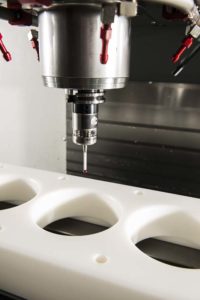
The demand for acid-resistant materials is on the rise as their unique properties make them well-suited for use in a number of industries. Acid-resistant materials offer chemical and corrosion resistance over wide temperature ranges and other extreme environmental conditions, include high-wear and high-load applications. Here are some of the best acid-resistant materials on the market.
Top 5 Acid-Resistant Materials
- Teflon® (PTFE) – Teflon® is a remarkable plastic, most well-known for its non-stick properties. But its chemical properties are equally impressive: pure PTFE is almost totally chemically inert and highly insoluble in most solvents or chemicals. As such it is often used in containers and pipework for reactive and corrosive chemicals. PTFE is also hydrophobic and has a wide operating temperature range, proving thermally stable enough to be used between -328ºF and +500ºF without degrading.
- Kynar® PVDF – PVDF is a fluoropolymer (like PTFE) and is one of the most stable and pure of all commercial resins. This thermoplastic is chemically resistant to strong acids, halogenated solvents, reducing agents, and petrochemical mixtures. Kynar® also has excellent resistant to temperature, nuclear radiation, abrasion, weatherability, and UV degradation. As such, it is commonly used in the power, renewable energies, and chemical processing industries, as well as automotive and mining, plating and metal preparation industries.
- PCTFE – Formerly known under the trade name KEL-F, PCTFE has many similar properties to other fluoropolymers, but has superior rigidity and very low gas permeability. Its high compressive strength and low deformation under load makes PCTFE a popular choice for structural parts that require high temperature and chemical resistance. PCTFE resists most corrosive chemicals, has near-zero moisture absorption, and performs well between -400°F and 400°F.
- CPVC – This resin is made by chlorination of PVC resin and is primarily used to produce piping. CPVC has many similar properties to PVC – such as low conductivity – but the extra chlorine increases its corrosion resistance, and also makes it more flexible and able to withstand higher temperatures. CPVC is readily workable, fire-retardant, and can be used to temperatures of 180ºF. It can be used in hot- and cold-water pipes, chlorine pipes, sulfuric acid pipes, and industrial liquid handling.
- Halar® (ECTFE) – This semi-crystalline, partially fluorinated polymer is commonly used as a coating material in protection and anti-corrosion applications. Halar® is easy to process, has excellent corrosion and chemical resistance, extraordinary high-impact strength in temperatures ranging from -104ºF to 302ºF, and has a very smooth surface and high purity. Halar® can resist acids and strong bases up to pH 14, and has excellent barrier properties to oxygen, carbon dioxide, hydrochloric acid, and chlorine gas. It is commonly used for chemical storage, fluid handling, pump and valve components, semiconductor process equipment, solid and lined pipe, and tanks and tank linings.
We Can CNC Machine Your Acid-Resistant Materials
Whether you need acid-resistant materials for automotive, aerospace, oil and gas, or semiconductor applications, we can machine and fabricate the parts you need. Call us today at 610-926-3245 to talk to one of our expert sta
